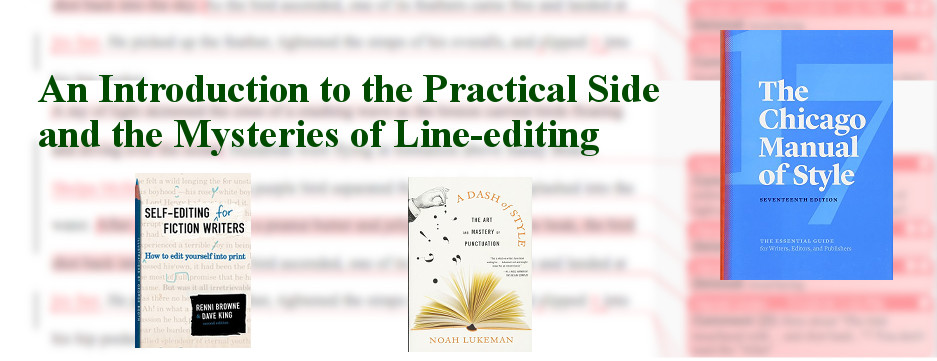
KBR Archives
This class was originally held in fall 2018 and is now part of the KBR Archives.
You can view a free video recording of the first session, which introduces line-editing, explains how it is different from other editing, and gives details of the other sessions of the class.
Contributors: We could not have made this course into the rich learning experience we intend it to be without help from writers and editors who contributed sample materials showing the development of published books, or who did a demonstration of their own line-editing on samples we sent them. Read about who they are and what they contributed.
Is the class for former students of our revision classes? New students? Beginning or experienced writers? Find those questions answered here. To see what people have said about our past workshops, see our What Our Students Say page. If you have a different question, please feel free to contact us.
Session 2 -- The Teachable Part 1: Learning and practicing to identify and fix specific kinds of sentence- and paragraph-level problems, such as sequence, repetition/near-repetition, and clarity.
Session 3 -- The Teachable Part 2: Learning and practicing to identify and fix specific kinds of sentence- and paragraph-level problems, such as connection, run-on sentences, and clumsy phrasing.
Session 4 -- Introduction to the Mysteries: Using real-life and published examples showing different editors responding to manuscripts, introduces the personal side, as editors respond based on their experience, taste, and the needs of the author.
Session 5 -- The Mysteries in Practice 1: We work through another real-life sample and then apply what we have learned to samples contributed by students.
Session 6 -- The Mysteries in Practice 2: More practice using samples contributed by students; students line-edit the samples ahead of time and then compare to the work we do on-screen.
Session 7 -- Out into the World: A look at more examples from line-editing to published; practice work to do after the class is over; planning for a line-editing networking group and other ways to keep in touch.
Make-up Date -- To be determined.
Frequently asked questions: If you have questions, you may find them answered on this page.
Harold Underdown and Eileen Robinson have worked together since 2008 to bring something different to aspiring authors. They have created online classes and tutorials and in-person workshops, presenting and working with writers at SCBWI conferences, recent workshops and retreats in Syracuse, Columbus, and Seattle, and an annual 4-day retreat at the Highlights Foundation. More information on their backgrounds.
Overview
We have been teaching the art of revision for years now, focusing on the two ends of the process--the big picture work writers do at the beginning, and the polishing they do at the end. Until now, we hadn't tackled line-editing, which comes in between and focuses on sentences and paragraphs. Until now, we hadn't found a way to teach it. Now we have, by breaking line-editing down into two distinct parts.
The Teachable: In this component of line-editing, editors work at the sentence and paragraph level to fix problems such as sequence, repetition, clarity, connection, run-on sentences, and clumsy phrasing. These issues can be taught and practiced, and we will do that, with hands-on exercises.
Someone line-editing must put both those parts together to be effective. Our goal is to get students started as line-editors, teaching them skills they can use on their own work and on that of others, and sending them off with additional practice and resources they can use to keep learning.
The Mysteries: Less objectively, editors bring their experience and taste to bear, asking questions, pointing out problems, even making suggestions. This part of line-editing is usually learned in-house by young editors in an apprenticeship approach. We will help students develop their own "touch" in this area, through the use of published examples to learn from and work on.
Dates and Topics Covered
Here's what to expect from the webinar:
Session 1 -- Introduction and Overview: What line-editing is, and what it isn't; line-editing in the editorial process; line-editing by hand versus Word; an introduction to key resources; what to expect in the class.
As in all of our classes, you can expect a clear framework, practical examples, plenty of handouts and hands-on practice, recommended resources, and time for questions and discussion. All questions will be answered, either in class or by personal email.